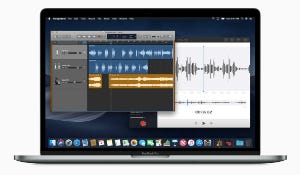Coming Soon to the Apple Mac: iOS Apps
Apple kicked off this week’s annual Worldwide Developer Conference (WWDC) revealing extensions to iOS apps that will run natively on the next release of macOS. But the company said it’s not merging the two platforms.
June 5, 2018

(Pictured above: Apple’s Craig Federighi on stage at the company’s Worldwide Developer’s Conference in San Jose, California, June 4.)
Apple this week revealed a revamped Mac App Store that will ultimately feature popular iOS mobile apps built to run natively on the next version of macOS. But the company emphasized that the effort to enable iOS apps to run on macOS shouldn’t fuel speculation that it intends to merge the two platforms.
Apple previewed the next versions of iOS and macOS to kick off its annual Worldwide Developer Conference (WWDC), taking place this week in San Jose, California. During the opening keynote, Craig Federighi, Apple’s senior vice president of software engineering, addressed the frequent question regarding Apple’s plans to merge the two operating systems.
“No, of course not,” Ferderighi said.
“We love the Mac, and we love macOS because it’s explicitly created to the unique characteristics of Mac hardware like the ergonomics of the keyboard and the trackpad, the flexibility in displays and storage. And because of the power it exposes, makes the Mac able to accomplish almost anything.”

Nevertheless, Federighi said Apple wanted to make it easier for developers to port popular iOS apps to the forthcoming macOS upgrade, code-named Majave. Apple is building extensions to its iOS frameworks and the platform UIKit tooling, enabling iOS apps to use Mac hardware features such as navigation of the trackpad, resizing windows, cut and paste, and drag and drop.
The first deliverables from this multiyear project will include several popular iOS apps. News, Voice Memos, Home and Stocks will be available on Mojave, along with the new multi-party FaceTime service coming to iOS 12 this fall. The company already has begun testing the apps internally.
“It turns out they make fantastic Mac apps, and we were able to bring them to the Mac with very few code changes,” Federighi said of the iOS apps. Developers will be able to use this new capability next year, he added.
Dean Hager, CEO of Jamf, a provider of enterprise management software for Macs, said Apple’s effort could appeal to companies considering PC replacement.
“With the coming ability to port iOS apps to the Mac and Apple’s statement that iOS and macOS are not merging, hopefully people will finally stop claiming that,” Hager said. “MacOS probably has the greatest user loyalty of any OS in history. With Microsoft transforming into a cloud company – and caring less about owning the client – the opportunity has never been bigger for Apple to win massive market share with the Mac.”
Share of Apple Macs have remained relatively flat, slightly below 7 percent, according to Gartner and IDC, though Apple reported last month that it shipped 4.1 million systems in its second fiscal quarter. The move is more likely to keep Macintosh developers engaged rather than draw a large number of Windows shops, said Patrick Moorhead, founder and principal analyst with Moor Insights and Strategies.
“Apple had to do something to keep devs excited about macOS, and bringing iOS apps to the platform could be that motivator,” Mooorhead said.
Apple CEO Tim Cook gave a vast portion of the airtime in the opening session to iOS 12, which the company is readying for iPhone and iPad users this fall. The company also announced improvements to iOS versions for Apple Watch and Apple TV.
Industry analysts describe new features coming to iOS as evolutionary — and should be well-received by customers. The promise that iOS 12 will improve performance on devices dating back to the iPhone 5s is important, considering the backlash following revelations that Apple was throttling performance on its iPhones in recent iOS updates to preserve battery life.
Apps will launch 40 percent faster on an iPhone 6 Plus and the keyboard will come up 50 percent faster, according to Federighi. The photo slider will activate 70 percent faster, he added, attributing the boost to more intelligence in the OS.
“In iOS 12, we’re much smarter,” he said. “When we detect that you need a burst of performance like when you begin scrolling, or launching an app, we ramp up processor performance instantly to its highest state, delivering high performance — and ramp it down just as fast to preserve battery life. These are some improvements that are coming to not just our older devices but the full range of devices.”
About the Author
You May Also Like


